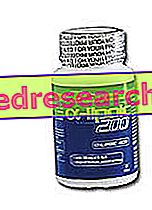
Information on α-Lipoic 200 PRO ACTION
α-Lipoic 200 PRO ACTION.
Food supplement based on alpha-lipoic acid .
FORMAT
60 cps bottle, 388 mg each
COMPOSITION
ALIPURE Alpha Lipoic Acid: patented method of production of solvent free alpha lipoic acid, which guarantees the highest degree of purity.
Corn starch: excipient able to stabilize the active ingredient, and improve absorption
Capsule: edible gelatin
Dye: titanium dioxide.
| A CAPE OF α-Lipoic 200 PRO ACTION CONTAINS: | |
| Kcal | 1.5 |
| kj | 6.5 |
| Protein | 0.095 g |
| Carbohydrates | 0.093 g |
| Grassi | 0 g |
| Lipoic Acid (ALIPURE) | 200mg |
Product features α-Lipoic 200 PRO ACTION
Alpha Lipoic Acid 200mg - also known as lipoate or ALA, is a ubiquitous and fundamental molecule for proper cellular functioning.

Its many potentials have proved useful in the treatment of diabetic neuropathy, in the altered glucose metabolism in type II diabetics, in improving the lipid profile, in the treatment of hepatic, atheroschlerotic and cardiovascular diseases, and as a chelator of heavy metals.
Italian research, in particular, has been characterized in providing interesting data on the experimentation of this molecule.
Potential benefits for sports use α-Lipoic 200 PRO ACTION
- Increased antioxidant capacity of the organism, which is essential for very intense athletic performance
- Increased lean mass;
- Accumulation of muscle glycogen reserves;
- Increase in energy capacity;
- Fat reduction.
However, the only effects demonstrated and present in the literature are those related to the enhancement of antioxidant capacity, with a significant reduction in markers of oxidative damage and lipoperoxidation, and with an increase in the reduced form, therefore antioxidant, of glutathione, after physical activity.
Recommended use by the company - α-Lipoic 200 PRO ACTION
1 cps a day in a little water on a full stomach.
Use in α-Lipoic 200 PRO ACTION sports practice
Various dosages are proposed by the scientific literature.
In fact, between 200/400 mg a day, it has been shown to be effective as an antioxidant, reducing the level of ROS (powerful oxidizing agents) and reducing markers of oxidative damage.
In the treatment of diabetic neuropathy, on the other hand, its dosages can exceed even the gram, divided during the day.
Studies on the antioxidant capacity of lipoic acid in athletic performance show doses of 600mg / day for 8 days.
An old 1996 study shows that his blood level decreases by 20% when taken on a full stomach compared to fasting; however on the company presentation sheet it is recommended to take the capsule on a full stomach to avoid heartburn.
How to optimize your business - α-Lipoic 200 PRO ACTION
The potential applications of this molecule may be different, but it must be considered that not all of them have found a scientific confirmation, and many have not even been tested.
Surely if you wanted to enhance its antioxidant power, it could be effectively associated with other antioxidants, such as vitamin E, vitamin C, glutathione and coenzyme Q10. The benefits of antioxidant cocktails have been described several times in the scientific literature, and also seem to be effective in counteracting the increase in muscle damage following intense physical activity, and facilitating subsequent recovery.
Furthermore, in sports, it is used to associate this molecule with chromium picolinate and acetyl L carnitine: this association could optimize mitochondrial oxidative metabolism, both lipidic and glucidic, decisively increasing the muscle's energy capacity, and reducing the mechanisms that lead to lactate formation and fatigue sensation.
Caution!!!! The synergy between chromium picolinate and lipoic acid, could significantly lower the blood sugar (an action also documented by scientific studies), and induce an important hypoglycemia. Furthermore, a study shows that alpha lipoic acid, taken with creatine and sucrose, can increase muscle creatine pull, compared to creatine alone or creatine with sucrose after 5 days.
Rationale for use - α-Lipoic 200 PRO ACTION
The therapeutic effects of alpha lipoic acid in the treatment of numerous diseases are well established.
Few studies have been carried out, instead, on its application in the sports field: however from these the antioxidant role emerges, which is carried out in the reduction of markers of oxidative muscle damage, and in the increase of important antioxidants such as glutathione in its reduced form.
Regarding the association of antioxidants, the literature considers the activity of these to be effective in reducing oxidative damage both in pathological conditions and following physical activity, while the association between alpha lipoic acid and acetyl l carnitine has been documented in treatment of neurodegenerative diseases, in the reduction of mitochondrial function associated with age and in cardiovascular pathologies, proving to be effective in reducing oxidative damage, but above all in preserving the correct mitochondrial function.
Studies on the efficacy of their association in healthy individuals undergoing physical exercise are lacking.
Α-Lipoic 200 PRO ACTION side effects
At doses higher than 1200 mg / day, side effects such as itching, tingling and gastrointestinal tract diseases (diarrhea, vomiting and abdominal cramps) have been documented.
Precautions for use α-Lipoic 200 PRO ACTION
Contraindicated in cases of renal, hepatic, diabetic, pregnancy and lactation.
Interactions
Pharmacological - given the ability of lipoic acid to activate intracellular glucose intake, the simultaneous intake of hypoglycemic agents could have an unexpected and marked hypoglycemic effect; you should therefore consult your doctor before use.
Food - given the structure very similar to biotin, the two molecules could compete for the membrane transporter.
This article, elaborated on the critical re-reading of scientific articles, university texts and common practice, is for informational purposes only and is therefore not a medical prescription. It is therefore always necessary to consult your doctor, nutritionist or pharmacist before starting to use any kind of supplement . Further information on the critical analysis of α-Lipoic 200 PRO ACTION.
| BIBLIOGRAPHY |
Int J Sport Nutr Exerc Metab. 2003 Sep; 13 (3): 294-302. Effect of alpha-lipoic acid combined with creatine monohydrate on human skeletal muscle creatine and phosphagen concentration.Burke DG, Chilibeck PD, Parise G, Tarnopolsky MA, Candow DG. The effect of acetyl-L-carnitine and R-alpha-lipoic acid treatment in ApoE4 mouse as a model of human Alzheimer's disease. Shenk JC, Liu J, Fischbach K, Xu K, Puchowicz M, Obrenovich ME, Gasimov E, Alvarez LM, Ames BN, Lamanna JC, Aliev G. J Neurol Sci. 2009 Aug 15; 283 (1-2): 199-206. Epub 2009 Apr 1. Mitochondrial decay in the brains of old rats: ameliorating effect of alpha-lipoic acid and acetyl-L-carnitine. Long J, Gao F, Tong L, Cotman CW, Ames BN, Liu J. Neurochem Res. 2009 Apr; 34 (4): 755-63. Epub 2008 Oct 10. Effect of combined treatment with alpha-Lipoic acid and acetyl-L-carnitine on vascular function and blood pressure in patients with coronary artery disease. McMackin CJ, Widlansky ME, Hamburg NM, Huang AL, Weller S, Holbrook M, Gokce N, Hagen TM, Keaney JF Jr, Vita JA. J Clin Hypertens (Greenwich). 2007 Apr; 9 (4): 249-55. Mitochondrial membrane damage during aging process in heart: potential efficacy of L-carnitine and DL alpha lipoic acid. Savitha S, Panneerselvam C. Mech Aging Dev. 2006 Apr; 127 (4): 349-55. Epub 2006 Jan 20. Antioxidant therapy in human endocrine disorders. Golbidi S, Laher I. Med Sci Monit. 2010 Jan; 16 (1): RA9-24. Review.PMID: 20037503 [PubMed - indexed for MEDLINE] Related citations Antioxidant properties of an endogenous thiol: Alpha-lipoic acid, useful in the prevention of cardiovascular diseases. Ghibu S, Richard C, Vergely C, Zeller M, Cottin Y, Rochette L. J Cardiovasc Pharmacol. 2009 Nov; 54 (5): 391-8. Review. Alpha-lipoic acid as a dietary supplement: molecular mechanisms and therapeutic potential. Shay KP, Moreau RF, Smith EJ, Smith AR, Hagen TM. Biochim Biophys Acta. 2009 Oct; 1790 (10): 1149-60. Epub 2009 Aug 4. Review. Nutritional supplementation for type 2 diabetes: a systematic review. Bartlett HE, Eperjesi F. Ophthalmic Physiol Opt. 2008 Nov; 28 (6): 503-23. Review. Alpha-lipoic acid supplementation and diabetes. Singh U, Jialal I. Nutr Rev. 2008 Nov; 66 (11): 646-57. Review. Alpha-lipoic Acid Improves Endothelial Dysfunction in Patients with Subclinical Hypothyroidism. Gd X, Jh P, Hl S, Ls Z. Exp Clin Endocrinol Diabetes. 2010 Feb 16. [Epub ahead of print] Alpha-lipoic acid improves vascular endothelial function in patients with type 2 diabetes: a placebo-controlled randomized trial. Heinisch BB, Francesconi M, Mittermayer F, Schaller G, Gouya G, Wolzt M, Pleiner J. Eur J Clin Invest. 2010 Feb; 40 (2): 148-54. Epub 2009 Dec 27. Assessment of the antioxidant effectiveness of alpha-lipoic acid in healthy men exposed to muscle-damaging exercise. Zembron-Lacny A, Slowinska-Lisowska M, Szygula Z, Witkowski K, Stefaniak T, Dziubek W. J Physiol Pharmacol. 2009 Jun; 60 (2): 139-43. Oral antioxidants and cardiovascular health in the exercise-trained and untrained elderly: a radically different outcome. Wray DW, Uberoi A, Lawrenson L, Bailey DM, Richardson RS. Clin Sci (Lond). 2009 Mar; 116 (5): 433-41. Effects of antioxidant supplementation and exercise training on erythrocyte antioxidant enzymes. Marsh SA, Laursen PB, Coombes JS. Int J Vitam Nutr Res. 2006 Sep; 76 (5): 324-31. Endocr Pract. 2002 Jan-Feb; 8 (1): 29-35. Evans JL, Heymann CJ, Goldfine ID, Gavin LA. Eur J Clin Pharmacol. 1996; 50 (6): 513-4. Influence of food intake on the bioavailability of thioctic acid enantiomers.Gleiter CH, Schug BS, Hermann R, Elze M, Blume HH, Gundert-Remy U. |



